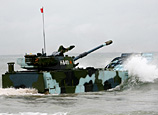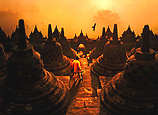
 |
| Poster (file photo) |
AS dining tables groan with plenty in affluent urban China, Feng Xiaogang's "Back to 1942" provides a dark reminder of famine not so very long ago. Xu Wei reports.
Films by sure-handed director Feng Xiaogang are usually a big commercial success, be they romantic comedies, period epics or his 2010 film "Aftershock" about a family torn apart by the 1976 Tangshan earthquake.
His latest offering - another venture into disaster films and his darkest yet - is "Back to 1942" about the epic famine in Henan Province where drought meets warfare, government denial, greed and corruption.
Released late last month, it's disturbing and thought-provoking. Not only does it depict suffering and savagery, but also the factors behind the famine and exodus that claimed at least 3 million lives.
Landowner and tenant find themselves on the same primitive level, distinctions erased, scrambling for food. A mother sells herself for grain to feed her starving children. Japanese warplanes strafe roads packed with refugees. Bodies litter the route, dogs eat corpses and much worse goes on.
It's not exactly holiday fare, and its release just two weeks ago may not have been ideal timing, especially given plenty of competing upbeat films. Feng says he knew he was gambling on the grim epic in the first place, and hoping that the grim subject matter and philosophical questions would not scare off loyal fans.
But compared with "Aftershock," considered a huge success and China's best disaster movie, "Back to 1942" is a box-office disappointment. Despite the aesthetics, impressive camera work, spectacles of chaos and migration, the film is far less popular than expected.
To date, the 210-million-yuan (US$33.6 million) film has only taken around 300 million yuan in ticket sales around China - less than half of Feng's hope for 700 million yuan.
Some observers suggested mood appeal in the Mayan-calendar doomsday and catastrophe predicted for Friday, but this famine flick falls short. Many movie-goers say they prefer fantasy or light-hearted fare to celebrate Christmas and the New Year.
Many young people don't see the point in Feng's film about the agonizing experience. Why make it? They ask.
People are more familiar with the 1976 Tangshan earthquake, which claimed 240,000 lives, and the so-called "three years of natural disasters" from 1959 to 1961, which claimed millions of lives. "The famine of 1942 is too far back. Audiences don't connect with it," says an audience member Jasmine Chen.
The film's violent and gruesome scenes are controversial. Wu Xiaobo, who watched it with her boyfriend, was distraught by watching starving refugees eat a cat.
"The scene lingers. My boyfriend and I are pet lovers and we lost our appetite," Wu says. And that's not the worst scene.
Nevertheless, making this epic has been a dream for Feng. The director with the golden touch is famous for romantic comedies such as "If You Are the One 2" (2010) and "If You Are the One" (2008), as well as "Assembly" (2007), which is compared with Steven Spielberg's "Saving Private Ryan" (1998), and the historic martial arts drama "The Banquet" (2006). His light-hearted, sometimes satirical fare, as well as blockbusters, have grossed more than 2 billion yuan nationally in recent years.
Based on Liu Zhenyun's 1992 novel "Remembering 1942," the film graphically depicts the famine in central China caused by drought and locusts, made worse by the Japanese invasion, warfare, diversion of food to Chinese troops, official denial of famine and failure to provide assistance. It came too little and too late after the Time magazine journalist Theodore White, played by Adrien Brody, exposed to the world the horrors of starvation.
 |
















![]()
